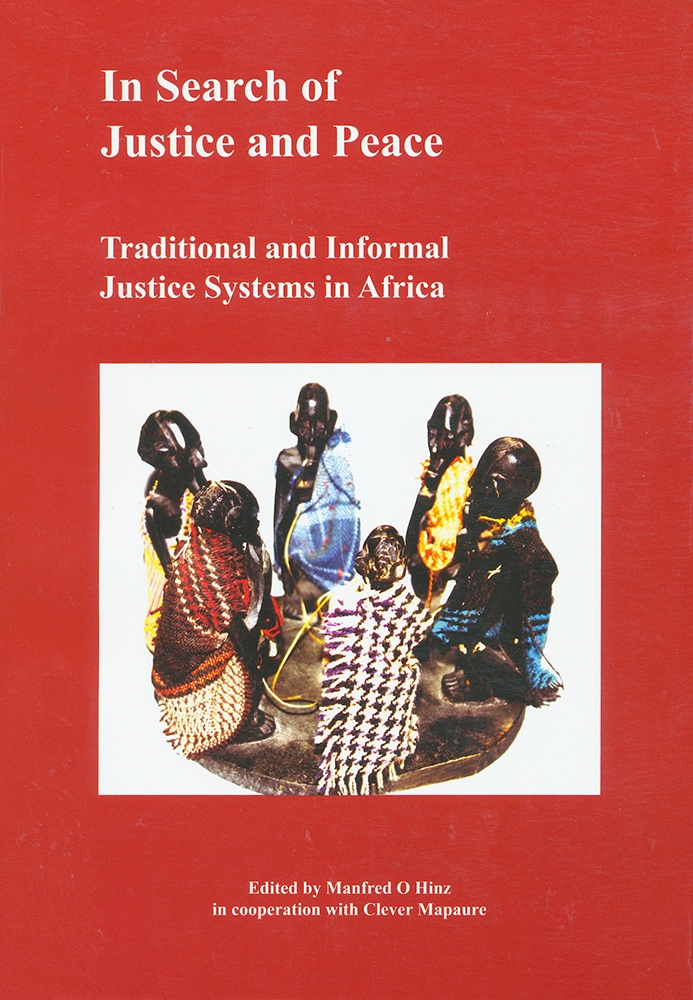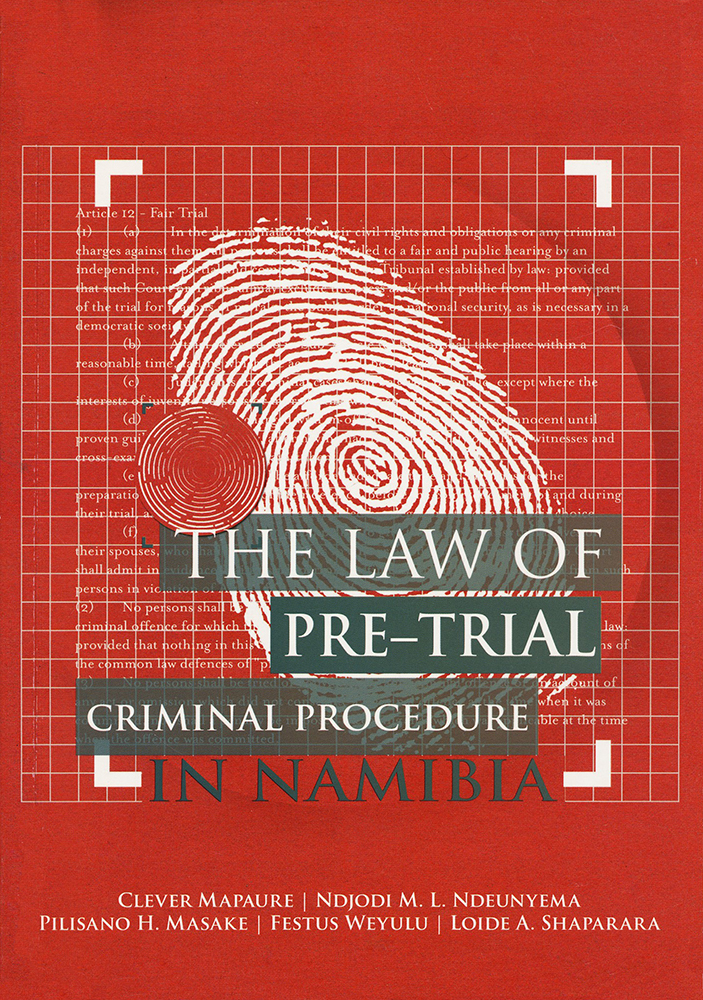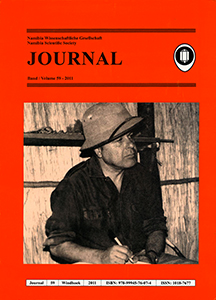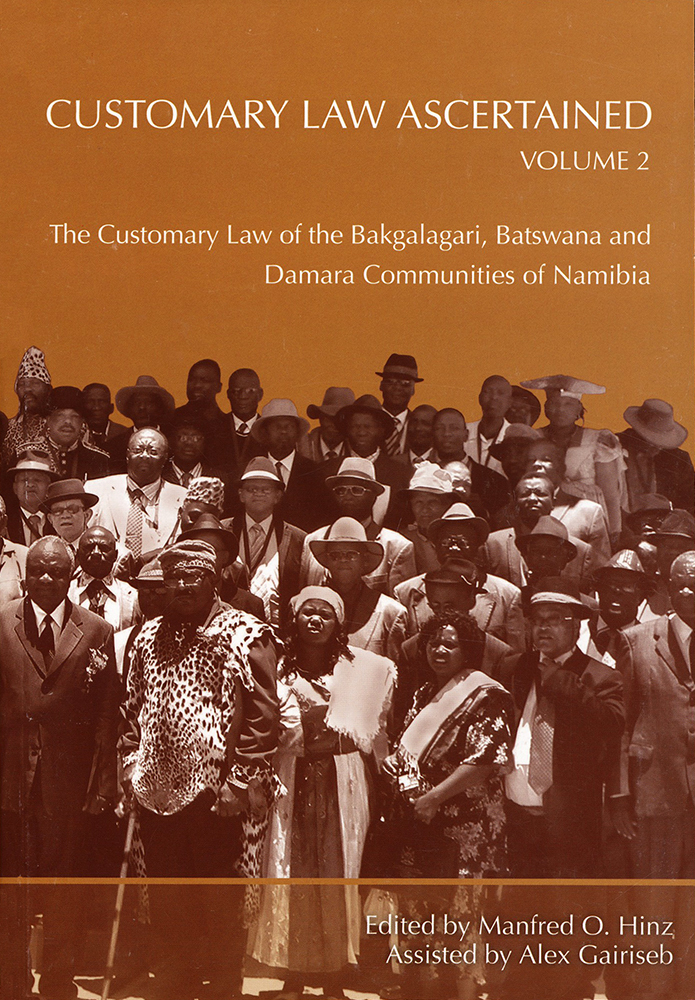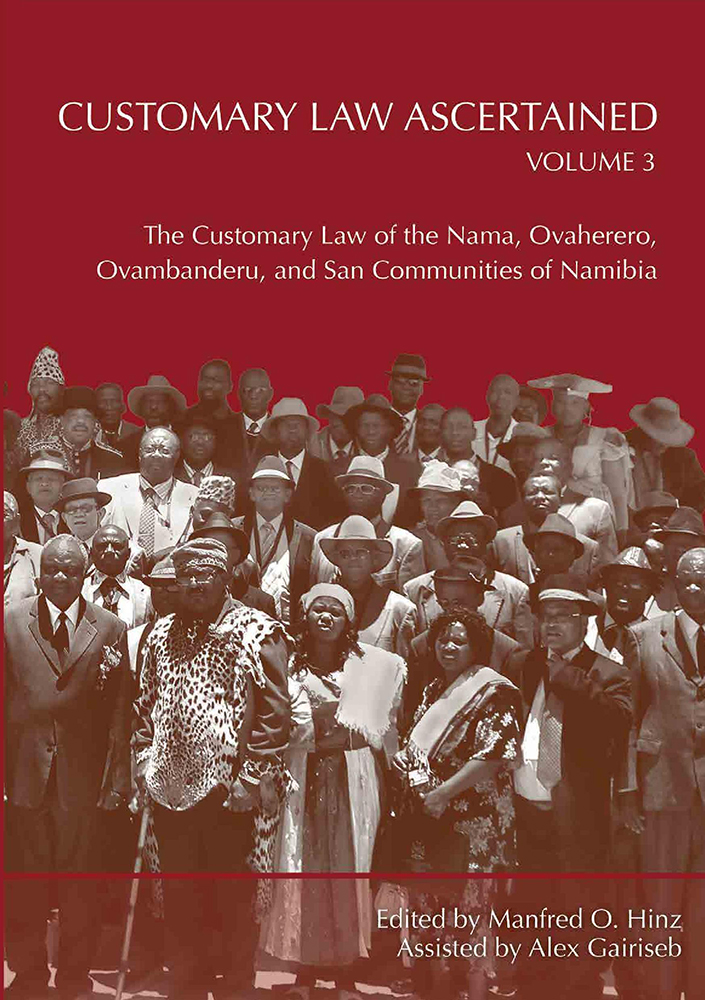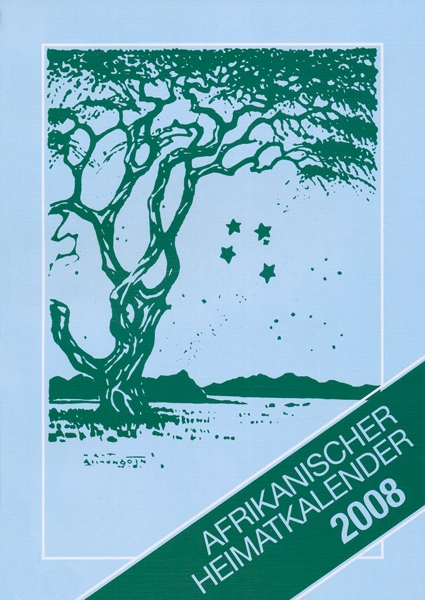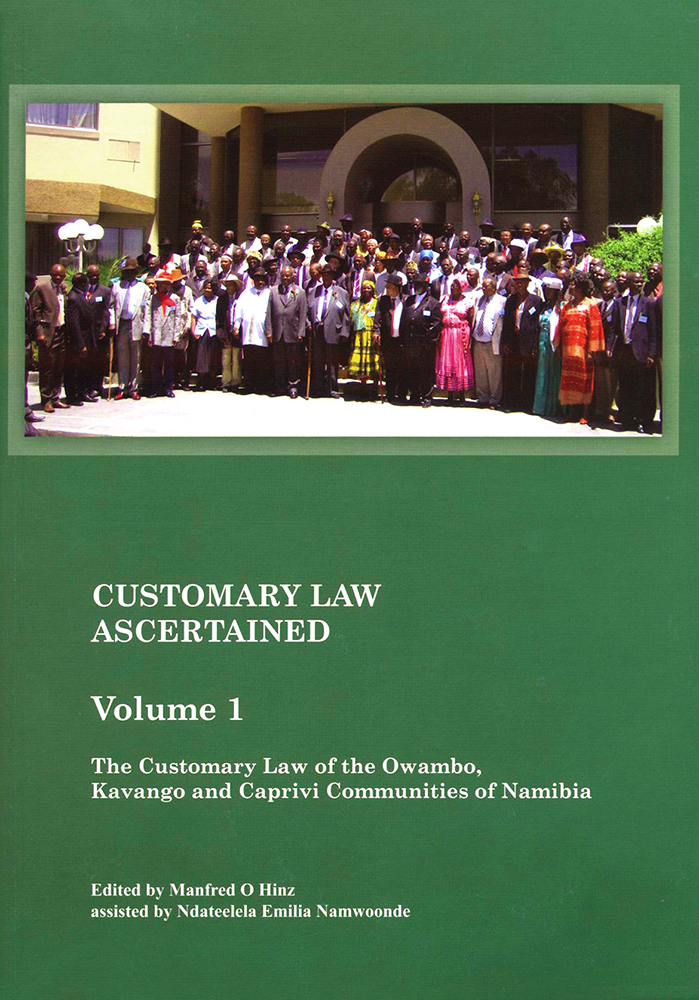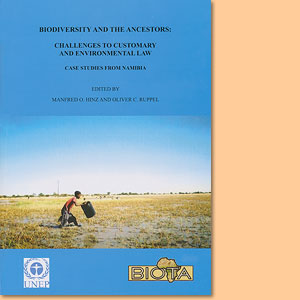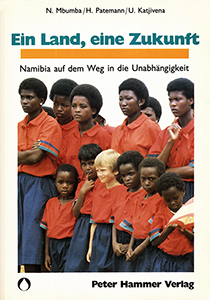In search of Justice and Peace. Traditional and Informal Justice in Africa, by Manfred O. Hinz and Clever Mapaure
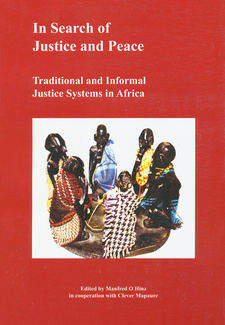
In search of Justice and Peace. Traditional and Informal Justice in Africa, by Manfred O. Hinz and Clever Mapaure. Namibia Scientific Society. Windhoek, Namibia 2010. ISBN 9789991640921 / ISBN 978-99916-40-92-1
In search of Justice and Peace introduces traditional and informal justice in various parts of Africa to secure justice and peace at the local level. Beside the contributors who are listed below, Manfred O. Hinz and Clever Mapaure are the editors of this study.
Prof. Manfred o Hinz studied law and philosophy at the University of Mainz, Germany, where he graduated in law. He did his legal practitioner examination in 1964, the year in which he also obtained his PhD from the University of Mainz. After studying anthropology, sociology and African and Oriental languages at the same university, he became assistant lecturer, teaching anthropology and public law. In 1971, he was appointed full Professor at the University of Bremen. In 1989, he went to Namibia where, after its independence in 1990, he assisted the Ministry of Justice in the restructuring of the administration of traditional justice and to compile an inventory of customary law. He was later seconded to the office of the first Vice-Chancellor of the University of Namibia (UNAM) to help build the first institution for legal education on Namibian soil: UNAM's Faculty of Law. He joined the Faculty upon its inception, where he served as Deputy Dean and, later, Dean of the Faculty. Prof. Hinz holds the United Nations Educational and Scientific Organisation Chair for Human Rights and Democracy in the Law Faculty's Human Rights and Documentation Centre. Prof. Hinz has published widely in his areas of specialisation, particularly in the fields of legal and political anthropology, and constitutional and international (economic) law. Latest publications: Hinz, MO & HK Patemann (Eds). 2006. The shade of new leaves: Governance in traditional authority-A southern African perspective. Münster: LIT Verlag; Hinz, MO & OC Ruppel (Eds). 2008. Biodiversity and the ancestors: Challenges to customary and environmental law. Case studies from Namibia. Windhoek: Namibia Scientific Society. E-mail: okavango(at)mweb.com.na
Mr Clever Mapaure studied law at UNAM. He was awarded a B Juris in 2007, and in 2008 graduated cum laude in the Specialised Certificate in Customary Law. He was one of the first candidates to be awarded this Certificate. In 2009 he graduated cum laude with his LLB and was awarded the Vice-Chancellor's Medal as the University's Best Undergraduate Student. In 2007, he was appointed to the Faculty of Law, where he tutored students in customary law, constitutional law, commercial law, contract law, and property law. In the summer of 2007/8, he served as a guest lecturer and tutor in African Law at the University of London's School of Oriental and African Studies, during which time he was also a guest lecturer at the Queen Mary School of Law where he offered a course on African Law. In 2005, he was elected President of the Law Students' Society, a post he held for two years. In 2008 he was elected as Executive Speaker of UNAM's Student Parliament. Mr Mapaure has done research in legal pluralism, traditional justice systems, and community-based natural resource management. He currently serves as a legal consultant as well as being a legal advisor to the UNAM Students' Representative Council. He is also a Master of Laws candidate, specialising in environmental law and communal property rights. Latest publications: Hinz, MO & C Mapaure. 2009. "Legal pluralism and the apartheid past: Challenges to Namibian family law reform and development". Family Law (Eds). International survey of family law. Bristol: Jordan Publishing Ltd, pp 301-327; Mapaure, C. 2009. "Child labour: A universal problem from a Namibian perspective". In Ruppel, OC (Ed.). Children s rights in Namibia. Macmillan Education Namibia. E-mail: mapaurec(at)live.com
Ms Prisca Nangoma Anyolo studied law at UNAM. She obtained a BJuris, a Specialised Certificate in Customary Law, and an LLB in 2007, 2008 and 2009, respectively, from UNAM. She is currently doing her LLM at the same university. Prior to studying law, she obtained a Diploma in Public Administration and Development Studies and an Advanced Diploma in International Relations and Diplomacy from the United Nations Institute for Namibia in Lusaka, Zambia. She became the first Town Clerk of the Rehoboth Town Council in 1992. She served as Secretary to the Council of Traditional Leaders from 1999 to 2004 under the then Ministry of Regional and Local Government, Housing and Rural Development. During the Namibian liberation struggle, Ms Anyolo was a youth leader and political commissar. Latest publication: Anyolo, P. 2008. "Polygyny among the Ovambadja: A female perspective". In Ruppel, OC (Ed.). Women and custom in Namibia: Cultural practice versus gender equality?. Windhoek: Macmillan Education Namibia, pp 83-92. E-mail: anyolop(at)gmail.com
Ms Sara Araiijo is a researcher at the Centre for Social Studies at the University of Coimbra. Her Master's dissertation was entitled "Legal pluralism and access to justice: The role of community justices in Mozambique". She is currently a PhD student at the same university, and is tackling the topic of law, justice and citizenship in the 21 st century. Having participated in a penetrating field investigation focused on the Mozambican legal pluralism, she formed part of the research team that revised the judicial organisation of Mozambique, a project that was coordinated by the Centre for Social Studies and the Mozambican Centre for Juridical and Judiciary Training. Since 2008, she has been an associate member of the Centre for African Studies of the Eduardo Mondlane University in Maputo. Latest publications: Araüjo, S. 2008. "Pluralismo juridico em Africa. Fic^äo ou realidade?". Revista Critica de Ciencias Sociais, 83:121-139; Araüjo, S. 2008. "Pluralismo juridico em Mozambique. Uma realidade em movimento". Revista Sociologia Juridica, 6, Janeiro/Junho; available at sociologiajur.vilabol. uol.com.br/rev06sara.htm; last accessed 18 February 2010.
(at)ces.uc.ptMr Francois X Bangamwabo did his LLB at the University of Zimbabwe and his LLM at the National University of Ireland, Galway. He is a registered legal practitioner in Zimbabwe where he also practised law for four years before moving to Ireland to pursue his studies in 2005. After completing his LLM, he briefly worked in Zimbabwe as a Project Officer for the Zimbabwe Lawyers for Human Rights, before being appointed law lecturer at UNAM in 2007. He is now the Acting Deputy Dean of UNAM's Faculty of Law and lectures Law of Contract and Public International Law. Mr Bangamwabo has published in the fields of human rights law and public international law. Latest publication: Ruppel, OC & F-X Bangamwabo. 2008. "The SADC Tribunal: A legal analysis of its mandate and role in regional integration". In Bösl. A, W Breytenbach, T Hartzenberg, C McCarthy & K Schade. Monitoring regional integration in southern Africa: Yearbook (Vol. 8). Cape Town: tralac. E-mail: fbangamwabo(at)unam.na
Prof. Tom W Bennett studied Law and Linguistics at Rhodes University, where he graduated with a BA LLB in 1972. In 1980, he received his PhD from the University of Cape Town (UCT). He is now a Fellow of UCT and Professor in its Department of Public Law. He is a recipient of the Alexander von Humboldt Fellowship, and has paid many visits to Germany. Bennett has published widely in the field of African customary law and human rights. As a member of the special project Committee on Customary Law, he has written several papers for the South African Law Reform Commission. Latest publications: Bennett, TW. 1995. Human rights and customary law under the South African Constitution. Juta: Cape Town; Bennett, TW. 2004. Customary law in South Africa. Juta: Cape Town; Bennett, TW. 1997. Report on the application of customary law. Windhoek: Law Reform and Development Commission.
Prof. Lorenz Böllinger studied law at the University of Frankfurt/Main, Germany, and the University of Grenoble, France. He received his PhD in Law from the University of Frankfurt/Main in 1978. He was also awarded an MA in psychology at the latter university. After three years of lecturing at the Universities for Applied Sciences in Dortmund and Frankfurt/Main, he was appointed Professor at the Law Department of the University of Bremen, and served as its Dean between 1998 and 2001. He has published widely in the fields of criminal law, criminology and social psychology. Latest publication: Böllinger, L. 2009. Commentary of the laws of forensic commitment. Bremen: Nomos Verlag. E-mail: boe(at)uni-bremen.de
Prof. Fatou Camara serves as Associate Professor of Law at Cheikh Anta Diop University in Dakar, Senegal (www.fsjp/ucad.sn), specialising in alternative dispute resolution, family law, private international law, and African customary law. She studied law at Pantheon-Assas Paris II University, where she received all her law degrees. She received her PhD in law at Cheikh Anta Diop. Latest publications: Camara, F. 2007. "Women and the law - A critique of the Senegalese family law". Social Identities Journal for the Study of Race, Nation and Culture, 13(6):787-800. Camara, F. 2008. "La parite au Senegal: Une exigence de l'Etat de droit moderne conforme au droit constitutionnel precolonial". Rapports sociaux de sexe/genre et droit: Repenser le droit. Paris: Editions des Archives Contemporaines. E-mail: camarafatkine(at)yahoo.fr
Ms Tracy Dexter serves as Country Director in Burundi for International Alert, a peace-building organisation. She has a background in human rights law, having been a Fellow at the Urban Morgan Institute for Human Rights as part of her JD programme at the University of Cincinnati College of Law. She has worked on human rights promotion, democratic development and conflict transformation in Africa for 15 years, 9 of which have been in Burundi. Latest publication: The contribution to the current volume is one of few written contributions made throughout years of fieldwork and advocacy. E-mail: tdexter(at)international-alert.org
Prof. Fernanda Chipela Conceicao Domingos currently serves as Assistant Professor at the Faculty of Law in the Catholic University of Angola. She obtained her undergraduate degree at the same university in 2006. Postgraduate studies in international trade law were completed through the Faculty of Law at the University of Agostinho Neto in Luanda, Angola, in coordination with the Faculty of Law at the New University of Lisbon, Portugal. From 2006 to 2009, Prof. Domingos worked at the Legal Department's administrative office. She participated in drawing up an administrator's manual and a municipal administrator's booklet, as well as being involved in updating the publication by Professors Carlos Feijö and Cremildo Paca on administrative law. She is currently an officer for the Attorney-General.
Prof. Nico Horn obtained his undergraduate degree at the Rand Afrikaans University, now incorporated into the University of Johannesburg, following which he was awarded a BTh Honours and an LLM from the University of South Africa; an MA (cum laude) from the Nelson Mandela Metropolitan University; and a PhD from the University of the Western Cape. Prof. Horn has served as Dean of UNAM's Faculty of Law since January 2008. Before that he was Director of UNAM's Human Rights and Documentation Centre. He was a William Paton Fellow at the University of Birmingham in 1992, and a visiting lecturer at Stanford University in January 2008. Prof. Horn is the first and current Editor-in-chief of the Namibia Law Journal. He has published and/or edited a total of 7 books and 37 articles in academic journals or as chapters in academic books. Latest publication: Horn, N & A Bösl (Eds). 2009. Human rights and the rule of law in Namibia (Second Edition). Windhoek: Macmillan Education Namibia. E-mail: nhorn(at)unam.na
Dr Shin-ichiro Ishida studied social anthropology at Keio University and Tokyo Metropolitan University. He received his PhD in social anthropology from the latter university in 2005. After working as a Japan Society of the Promotion of Science Research Fellow at the National Museum of Ethnology in Osaka, Japan, he moved to Osaka University in 2007. He is now a Research Assistant Professor at the School of Human Sciences. He has published in the field of legal anthropology, legal pluralism and African law. Latest publication: Ishida, Shin-ichiro & Takeshi Tsunoda (Eds). 2009. Legal culture in a globalised world [in Japanese]. Tokyo: Fukumura. E-mail: chirosh(at)mac.com
Mr Eliamani Laltaika holds an LLB from Tumaini University, Tanzania, an LLM in environmental law from the University of KwaZulu-Natal, South Africa, and an LLM in intellectual property law from the Munich Intellectual Property Law Centre, Germany. He is currently a doctoral candidate at the Max Planck Institute for Intellectual Property, Competition and Tax Law in Munich. Latest publication: Laltaika, Eliamani. 2008. Intellectualproperty rights inplantgeneticresources:Implicationsforfoodsecurity, poverty alleviation and biodiversity conservation in sub-Saharan Africa. Dar es Salaam: Tanzania Commission for Science and Technology (COSTECH). E-mail: laltaika(at)yahoo.com
Dr Maria Paula Meneses is a Senior Researcher at the Centre for Social Studies, University of Coimbra. She holds a PhD in anthropology by Rutgers University, United States of America. She previously held a professorship at Eduardo Mondlane University, Mozambique. Her current research interests include colonial and post-colonial debates,
identity processes and conflicts, the relationship between state and 'traditional authorities' in the African context, legal plurality and the role of official history, patriotic history, and memory within contemporary identity debates. Her work has been published in journals, books and reports in several countries. Zatof/JwM (Eds). 2009. Epistemologies of the South.
Prof. Werner Menski obtained an interdisciplinary MA from the University of Kiel in Germany in 1976 and then taught South Asian Studies at Bochum University in 1977-1980 before relocating to London, where he obtained a PhD in Hindu law in 1983. At School of Oriental and African Studies at the University of London, he has taught courses on South Asian laws, comparative legal theory, ethnic minorities and the law, and family law since 1981. Prof. Menski has also served as Professor of South Asian Laws since 2004. Latest publication: Menski, W. 2009. Ethnic minority legal studies. Aldershot: Ashgate. E-mail: wm4(at)soas.ac.uk
Justice Deng Biong Mijak studied civil and Sharia laws at Khartoum University in the Sudan, from where he graduated with an LLB in 1985. He joined the then Sudan People's Liberation Movement's liberation struggle in South Sudan in 1986, where he served as a military and judicial officer in a number of military units and liberated areas populated by civilians. In 1995, he was appointed Justice of the High Court, from where he moved to his current position as a Counsel General/Director of Training and Research in the Ministry of Legal Affairs and Constitutional Development in the Government of Southern Sudan. Justice Mijak has researched and written extensively about the customary laws of the people of his native Southern Sudan. E-mail: dkokdek(at)yahoo.com
Prof. Philippe Ntahombaye is a lecturer at the University of Burundi's Faculty of Letters and Human Sciences. He has occupied many administrative and academic positions including the Dean of that Faculty and Director of Research. He is a Member of the Scientific Council of UNESCO's Chair for Peace and Peaceful Conflict Resolution. He also serves as President of the Commission of Reflection on the Rehabilitation of the Bashingantahe Institution. As a linguist and anthropologist, he has published many articles on the Burundi language and culture, and has supervised many works on culture and peaceful conflict resolution as well as a study on the Bashingantahe institution. Latest publication: Dexter, T & P Ntahombaye. 2005. The role of informal justice systems in fostering the rule of law in post-conflict situations: The case of Burundi. Geneva: Centre for Human Dialogue. E-mail: philippentaho(at)yahoo.fr
Dr Effa Okupa studied at Homerton College, Cambridge, and at University College London. She received her PhD in African law and jurisprudence from the School of Oriental and African Studies at the University of London. Latest publication: Okupa, E. 2006. Carrying the sun on our backs: Unfolding German colonialism in Namibia from Caprivi to Kasikili. Berlin: LIT Verlag. E-mail: efkuku(at)talk21.com
Ms Helgard KM Patemann studied sociology, economics and philosophy at the University of Frankfurt, and political science, history and education at the University of Bremen, where she obtained degrees in education (first and second state examinations). She was a Research Fellow at the University of Bremen and for the University of Benghazi, Libya, reconstructing national history, doing research on social and political history and perspectives of the Mediterranean area, and lecturing on comparative 'Third World' studies. She worked on a cooperation project with the United Nations Institute for Namibia, Lusaka, Zambia, and was an advisor to the Namibian government. She was Co-director of the Centre for Applied Social Sciences at UNAM's Faculty of Law. She has published in the field of history, anthropology, social and development studies, and local and comparative ethics. Latest publication: Patemann, H. 2006. "The African local and the global: Frame of thought, legitimacy and changing tasks". In Hinz, MO & TF Gatter (Eds). Global responsibility-Local agenda: The legitimacy of modern self-determination and African traditional authority. Berlin: LIT Verlag. E-mail: Helgard(at)Patemann.net
Dr Oliver C Ruppel serves as Director of the Human Rights and Documentation Centre associated with UNAM's Faculty of Law, where he also lectures. He is a legal advisor to the Office of the Ombudsman in Namibia. Dr Ruppel graduated in law after studies at the Universities of Lausanne (Switzerland) and Munich (Germany). He holds an LLM in public law from the University of Stellenbosch (South Africa); a postgraduate degree in philosophy from the Munich School of Philosophy SJ (Germany); a doctoral degree in comparative law from the University of Pressburg (Slovakia); and a Master of Mediation degree from the University of Hägen (Germany). Latest publication: Ruppel, OC (Ed.). 2009. Children's rights in Namibia. Windhoek: Macmillan Education Namibia. E-mail: ocruppel(at)unam.na
Dr Katharina G Ruppel-Schlichting is a Senior Legal Researcher and Business Manager of the Legal Research and Development Trust of Namibia in Windhoek, Namibia, and is a legal consultant to the Konrad Adenauer Foundation in Namibia and Angola. Dr Ruppel-Schlichting graduated in law after studies at the University of Passau and of Munich (both in Germany). She holds an LLM in public law from the University of Stellenbosch (South Africa) and a doctoral degree in law from the University of Bratislava (Slovakia). Latest publication: Ruppel-Schlichting, KG. 2008. "The independence of the Ombudsman in Namibia". In Horn, N & A Bösl (Eds). The independence of the judiciary in Namibia. Windhoek: Macmillan Education Namibia. E-mail: katharina.ruppel(at)googlemail.com
Adv. Chief Borenahabokhethe Sekonyela is a practising Advocate in the courts of Lesotho and in the High Court of South Africa. He obtained a BA Law and an LLB at the National University of Lesotho, and an LLM at the University of Edinburgh, Scotland, in 1987. He is the former Assistant Registrar as well as Acting Registrar of the High Court of Lesotho, and served as a Senior Legal Adviser on the multi-billion US Dollar Lesotho Highlands Water Project. Besides being a Motlokoa Prince, he is also custodian of the Batlokoa traditional initiation schools and legal adviser to the National Council for the Protection of Initiation Schools and Basotho Customs. Chief Sekonyela lectures in customary law, among other subjects, at the National University of Lesotho. He has written and presented many papers on indigenous knowledge systems, some of which are in the process of publication. E-mail: bh.sekonyela(at)nul.ls
Dr Harald Sippel studied law at the University of Bayreuth, Germany. From the same University he received his PhD in Law in 2003, and his habilitation in private law, comparative law, private international law, modern legal history and sociology of law in 2005. He is now Privatdozent at the Faculty of Law and Economics, University of Bayreuth, and the Manager of the Tanzanian-German Centre for Postgraduate Studies in Law at the Faculty of Law, University of Dar es Salaam, in cooperation with the University of Bayreuth and sponsored by the Deutscher Akademischer Austausch Dienst and the German Foreign Office. His research and publications have mainly centred on German private law, comparative law, legal pluralism, and legal history. Latest publication: Sippel, H & O Meinecke (Eds). 2008. Administration of justice in Africa - Effectiveness, acceptance and assistance. Cologne: Koppe. E-mail: harald.sippel(at)uni-bayreuth.de
Dr Sue Tatten holds a BS degree in criminal justice, an MA in international affairs/ African studies, and a Juris Doctor (JD) in Law/Human Rights. She has served as a Fellow at the Urban Morgan Institute for Human Rights as part of her JD programme at the University of Cincinnati College of Law. Over the last 25 years, Dr Tatten has served with the United Nations, the non-governmental organisation (NGO) community, and with the United States Agency for International Development (USAID) in East and southern Africa. She has been a Fulbright Scholar and lecturer on human rights, as well as a researcher on customary law in Botswana, Ethiopia, and Kenya; she has served as a USAID Senior Elections Advisor and Democracy Fellow in East Africa, and as a Democratic Governance Officer in Kenya, Rwanda, and Darfur-Sudan. With the NGO community, Dr Tatten served for three years with the National Democratic Institute in Ethiopia, which focused on democracy and governance, and civil society issues. With the United Nations Development Programme (UNDP) in Sudan, Dr Tatten has served as Senior Advisor on Customary Law and Gender in Darfur and Kassala; and currently is the Senior Rule of Law Advisor/Team Leader for the UNDP's Rule of Law programme in Southern Sudan. Latest publication: Dow, U, S Stumbras & S Tatten. 1997. "Looking at women's empowerment initiatives from a grassroots level". In Andreopolous, GJ & RP Claude (Eds). Human rights education for the Twenty-first Century. Philadelphia: University of Pennsylvania Press, pp 455^468. E-mail: suetatten(at)hotmail.com
Prof. Ulrike Wanitzek studied law at the University of Augsburg, Germany. She received the degree of Dr jur. (SJD) from the University of Bayreuth, Germany, in 1985 and her habilitation in 2000. Since then she has been teaching family law, sociology of law and comparative law, with a focus on law in Africa. She is now the Project Leader of the Tanzanian-German Centre for Postgraduate Studies in Law established at the University of Dar es Salaam in 2008 in cooperation with the University of Bayreuth and sponsored by the Deutscher Akademischer Austausch Dienst and the German Foreign Office. Dr Wanitzek has published in the fields of family law, land law, women's and children's rights, legal pluralism, and the sociology/anthropology of law. Latest publication: Wanitzek, U. 2008. "Women's and children's rights in Africa: A case study of international human rights and family law in Tanzanian courts". Recht in Afrika -Law in Africa - Droit en Afrique, 11:33-60. E-mail: ulrike.wanitzek(at)uni-bayreuth.de.
List of abbreviations:
ACHPR African Charter on Human and Peoples' Rights
APRA Arusha Peace and Reconciliation Agreement for Burundi
CPA Comprehensive Peace Agreement
FDRE Federal Democratic Republic of Ethiopia
ICCPR International Covenant on Civil and Political Rights
ICSS Interim Constitution of Southern Sudan
ID identity document
IDEA International Institute for Democracy and Electoral Assistance
ILO International Labour Organisation
MDG Millennium Development Goal
NCP National Congress Party
NGO non-governmental organisation
OHCHR Office of the High Commissioner for Human Rights
OTA Ombadj a Traditional Authority
PBSO Peacebuilding Support Office
SOAS School of Oriental and African Studies
SPLM Sudan People's Liberation Movement
SWAPO South West Africa People's Organisation (now SWAPO Party of Namibia)
UDHR Universal Declaration of Human Rights
UN United Nations
UNAM University of Namibia
UNDP United Nations Development Programme
US(A) United States (of America)
USAID United States Agency for International Development
This is an excerpt from the book: In search of Justice and Peace. Traditional and Informal Justice in Africa, by Manfred O. Hinz and Clever Mapaure.
Title: In search of Justice and Peace
Subtitle: Traditional and Informal Justice in Africa
Editors: Manfred O. Hinz; Clever Mapaure
Namibia Scientific Society
Namibia, 2010
ISBN: 978-99916-40-92-1 Namibia
ISBN: 978-3-941602-41-0 Europe
Softcover, 17x24 cm, 463 pages
Hinz, Manfred O. und Mapaure, Clever im Namibiana-Buchangebot
In search of Justice and Peace. Traditional and Informal Justice in Africa
In search of Justice and Peace introduces traditional and informal justice in various parts of Africa to secure justice and peace at the local level.
The Law of Pre-Trial Criminal Procedure in Namibia
The Law of Pre-Trial Criminal Procedure in Namibia explains the rights of individuals, the duties of law enforcement officers, and the procedures of the courts in criminal cases in Namibia.
Journal 59-2011 (Namibia Wissenschaftliche Gesellschaft)
Dies ist die 59. Ausgabe des Journals der Namibia Wissenschaftlichen Gesellschaft von 2011.
Customary Law Ascertained (Vol 2): The Customary Law of the Bakgalagari, Batswana and Damara Communities of Namibia
Customary Law Ascertained (Vol 2) is the second of a three volume series in which traditional authorities in Namibia present the customary laws of the Bakgalagari, Batswana and Damara communities.
Customary Law Ascertained (Vol 3): The Customary Law of the Nama, Ovaherero, Ovambanderu, and San Communities of Namibia
Customary Law Ascertained Volume 3 presents the customary laws the Nama, Ovaherero, Ovambanderu, and San communities of Namibia.
Afrikanischer Heimatkalender 2008
Afrikanischer Heimatkalender 2008: Seit 1930 Botschafter christlicher Werte in Namibia, mit vielen interessanten landeskundlichen, geschichtlichen, politischen und kulturellen Beiträgen.
Knowledge lives in the lake. Case studies in environmental and customary law from southern Africa
Knowledge lives in the lake: Case studies in environmental and customary law from southern Africa presents research within the framework of the international Biodiversity Monitoring Transect Analysis in Africa (BIOTA) Project.
Women and custom in Namibia
Is so called cultural practice surpressing gender equality in Namibia? The study Women and custom in Namibia seeks for answers and perspectives.
The customary law of the Owambo, Kavango and Caprivi Communities of Namibia
The customary laws of the Owambo, Kavango and Caprivi communities of Namibia were neglected during the past.
Biodiversity and the Ancestors. Challenges to Customary and environmental law case studies from Namibia
Spans an arc between legislative efforts on regional, national and local levels and traditional ways of maintaining the environment in Namibia
Ein Land, eine Zukunft. Namibia auf dem Weg in die Unabhängigkeit
'Ein Land, eine Zukunft. Namibia auf dem Weg in die Unabhängigkeit' will mit zahlreichen Beiträgen über Ideologie und Praxis des Kolonialsystems in Namibia sowie über politische und gesellschaftliche Utopien und Alternativen informieren.

